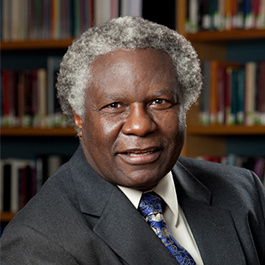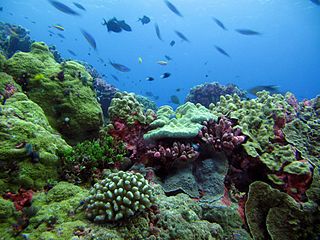
Environmental laws are laws that protect the environment. Environmental law is the collection of laws, regulations, agreements and common law that governs how humans interact with their environment. This includes environmental regulations; laws governing management of natural resources, such as forests, minerals, or fisheries; and related topics such as environmental impact assessments. Environmental law is seen as the body of laws concerned with the protection of living things from the harm that human activity may immediately or eventually cause to them or their species, either directly or to the media and the habits on which they depend.

The United Nations Environment Programme (UNEP) is responsible for coordinating responses to environmental issues within the United Nations system. It was established by Maurice Strong, its first director, after the United Nations Conference on the Human Environment in Stockholm in June 1972. Its mandate is to provide leadership, deliver science and develop solutions on a wide range of issues, including climate change, the management of marine and terrestrial ecosystems, and green economic development. The organization also develops international environmental agreements; publishes and promotes environmental science and helps national governments achieve environmental targets.

The United Nations Industrial Development Organization (UNIDO) is a specialized agency of the United Nations that assists countries in economic and industrial development. It is headquartered at the UN Office in Vienna, Austria, with a permanent presence in over 60 countries. As of April 2019, UNIDO comprises 170 member states, which together set the organization's policies, programs, and principles through the biannual General Conference.

The United Nations Economic Commission for Europe is one of the five regional commissions under the jurisdiction of the United Nations Economic and Social Council. It was established in order to promote economic cooperation and integration among its member states.

The International Union for Conservation of Nature (IUCN) is an international organization working in the field of nature conservation and sustainable use of natural resources. Founded in 1948, IUCN has become the global authority on the status of the natural world and the measures needed to safeguard it. It is involved in data gathering and analysis, research, field projects, advocacy, and education. IUCN's mission is to "influence, encourage and assist societies throughout the world to conserve nature and to ensure that any use of natural resources is equitable and ecologically sustainable".

The Global Environment Facility (GEF) is a multilateral environmental fund that provides grants and blended finance for projects related to biodiversity, climate change, international waters, land degradation, persistent organic pollutants (POPs), mercury, sustainable forest management, food security, and sustainable cities in developing countries and countries with economies in transition. It is the largest source of multilateral funding for biodiversity globally and distributes more than $1 billion a year on average to address inter-related environmental challenges.

Calestous Juma was a Kenyan scientist and academic, specializing in sustainable development. He was named one of the most influential 100 Africans in 2012, 2013 and 2014 by the New African magazine. He was Professor of the Practice of International Development and Faculty Chair of the Innovation for Economic Development Executive Program at Harvard Kennedy School. Juma was Director of the School's Science, Technology and Globalization Project at Harvard Kennedy School as well as the Agricultural Innovation in Africa Project funded by the Bill and Melinda Gates Foundation.
The United Nations Conference on the Human Environment was held in Stockholm, Sweden, during June 5–16, 1972.
An environmental emergency is defined as a "sudden-onset disaster or accident resulting from natural, technological or human-induced factors, or a combination of these, that causes or threatens to cause severe environmental damage as well as loss of human lives and property."
Proposals for the creation of a United Nations Environmental Organization (UNEO) have come as some question the efficacy of the current United Nations Environment Programme (UNEP) at dealing with the scope of global environmental issues. Created to act as an anchor institution in the system of Global Environmental Governance (GEG), it has failed to meet those demands. The UNEP has been hindered by its title as a Programme as opposed to a specialized agency like the United Nations Educational, Scientific and Cultural Organization (UNESCO) or the World Health Organization (WHO), in addition to a lack of voluntary funding, and a location removed from the centers of political power, in Nairobi, Kenya. These factors have led to widespread calls for UNEP reform, and following the publication of Fourth Assessment Report of the IPCC in February 2007, a "Paris Call for Action" read out by French President Chirac and supported by 46 countries, called for the UNEP to be replaced by a new and more powerful United Nations Environment Organization, to be modelled on the World Health Organization. The 52 countries included the European Union nations, but notably did not include the United States and BRIC, the top five emitters of greenhouse gases.
The Stockholm Declaration of 1972, or the Declaration of the United Nations Conference on the Human Environment, is the first United Nations declaration on the global environment. It consists of 26 principles and led to the creation of the United Nations Environment Programme (UNEP), which laid the foundation for future global environmental governance. The United Nations Conference on the Human Environment was held in Stockholm, Sweden, from June 5–16 in 1972. The 1972 United Nations Conference on the Human Environment signifies the first international effort to place environmental issues at the forefront of global concerns. The Conference sought to recognize the finite nature of Earth's resources and human impacts on the environment. It represented the beginning of a global dialogue on the link between economic growth, the pollution of the environment, and the well-being of humanity. The resulting Stockholm Declaration urged its partnering nations to reduce air, land, and water degradation by integrating science and technology in their development plans. It also called nations to create regulations on wildlife protection, environmental conservation, and population control. While the reception of the ideas in the Declaration generally stayed positive, it received wide criticisms on its practical implementation, especially from developing nations.
Environmental governance (EG) consists of a system of laws, norms, rules, policies and practices that dictate how the board members of an environment related regulatory body should manage and oversee the affairs of any environment related regulatory body which is responsible for ensuring sustainability (sustainable development) and manage all human activities—political, social and economic. Environmental governance includes government, business and civil society, and emphasizes whole system management. To capture this diverse range of elements, environmental governance often employs alternative systems of governance, for example watershed-based management. Obviously, in fact the EG arrangements are very diversed and not at all as inclusive as we could wish them to be.

The World Database on Protected Areas (WDPA) is the largest assembly of data on the world's terrestrial and marine protected areas, containing more than 260,000 protected areas as of August 2020, with records covering 245 countries and territories throughout the world. The WDPA is a joint venture between the United Nations Environment Programme World Conservation Monitoring Centre and the International Union for Conservation of Nature World Commission on Protected Areas.

Rajendra Madhavrao Shende, an alumnus of Indian Institute of Technology (IIT) and former director in United Nations Environment Programme (UNEP), is currently serving as the founder director of Green TERRE Foundation. which is a not-for-profit organization working towards global goals of NetZero, Carbon Neutrality, Climate Change, Global Warming and Environment, as per various protocols of United Nations' sustainable development goals (SDGs). He is the ideator and director of Smart Campus Cloud Network (SCCN) which is a network of global universities which have pledged to make their campuses carbon neutral by achieving NetZero targets. This program has been widely acclaimed as innovative and practical solution which offers the students hands-on experience and expertise in NetZero and Carbon Neutrality. He previously held the position as chairman of TERRE Policy Centre which is a not-for-profit organization engaged in the policy development and project based advocacy on the sustainable development. Before August 2011, he was the Head of the OzonAction Branch of the United Nations Environment Programme, Division of the Technology, Industry and Economics in Paris.

The United Nations Environment Programme Finance Initiative is a partnership between the United Nations Environment Program (UNEP) and the global financial sector to catalyse action across the financial system to align economies with sustainable development. As the UN partner for the finance sector, they convene financial institutions on a voluntary basis to work together with them, and each other, to find practical solutions to overcome the many sustainability challenges facing the world today. UNEP FI does this by providing practical guidance and tools which support institutions in the finance sector to find ways to reshape their businesses and commit to targets for limiting greenhouse gas emissions, protecting nature, promoting a circular economy and supporting financial inclusion to address inequality. The solutions developed effectively form a blueprint for others in the finance sector to tackle similar challenges and evolve their businesses along a sustainable pathway. The creation and adoption of such a blueprint also informs policy makers concerned with sustainability issues about what would constitute appropriate regulation for the finance sector at large. Founded in 1992, UNEP FI was the first organisation to pioneer engagement with the finance sector around sustainability. The Finance Initiative was responsible for incubating the Principles for Responsible Investment and for the development and implementation of UNEP FI's Principles for Responsible Banking and Principles for Sustainable Insurance as well as the UN-convened net-zero alliances. Today, UNEP FI provides sustainability leadership to more than 400 financial institutions, with assets of well over $80 trillion headquartered around the world.

The Minamata Convention on Mercury is an international treaty designed to protect human health and the environment from anthropogenic emissions and releases of mercury and mercury compounds. The convention was a result of three years of meeting and negotiating, after which the text of the convention was approved by delegates representing close to 140 countries on 19 January 2013 in Geneva and adopted and signed later that year on 10 October 2013 at a diplomatic conference held in Kumamoto, Japan. The convention is named after the Japanese city Minamata. This naming is of symbolic importance as the city went through a devastating incident of mercury poisoning. It is expected that over the next few decades, this international agreement will enhance the reduction of mercury pollution from the targeted activities responsible for the major release of mercury to the immediate environment.

The Environmental Protection Agency, is an agency of [[Ministry ], established by EPA Act 490 (1994). The agency is dedicated to improving, conserving and promoting the country’s environment and striving for environmentally sustainable development with sound, efficient resource management, taking into account social and equity issues. It oversees the implementation of the National Environment Policy. EPA Ghana's mission is to manage, protect and enhance the country’s environment and seek common solutions to global environmental problems. Its mission is to be achieved through an integrated environmental planning and management system with broad public participation, efficient implementation of appropriate programs and technical services, advice on environmental problems and effective, consistent enforcement of environmental law and regulations. EPA Ghana is a regulatory body and a catalyst for change to sound environmental stewardship.

The UNECE Environmental Performance Review (EPR) is an assessment process to evaluate the progress made by individual countries in improving their environmental policies. The EPRs are carried out under the auspices of the Committee on Environmental Policy of the United Nations Economic Commission for Europe (UNECE).

The Montevideo Programme for the Development and Periodic Review of Environmental Law (Montevideo Environmental Law Programme) is a United Nations sequential ten-year intergovernmental program for the development and periodic review of Environmental Law, designed to strengthen the related capacity in countries. The program was conceived in 1982.











